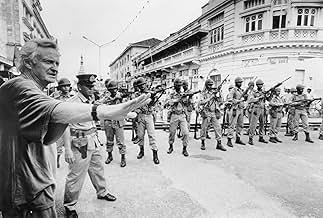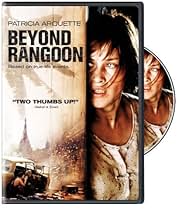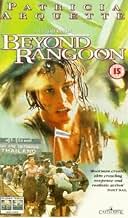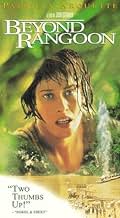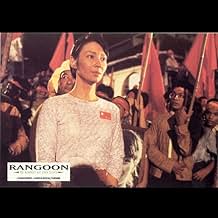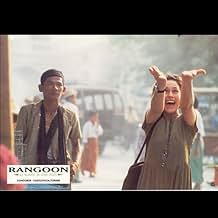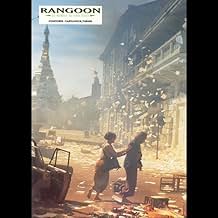NOTE IMDb
6,5/10
5,6 k
MA NOTE
Ajouter une intrigue dans votre langueAn American tourist finds herself in the middle of a political uprising in Burma.An American tourist finds herself in the middle of a political uprising in Burma.An American tourist finds herself in the middle of a political uprising in Burma.
- Réalisation
- Scénario
- Casting principal
- Récompenses
- 2 victoires et 3 nominations au total
Kuswadinata
- Colonel at Hotel
- (as Kuswadinath Bujang)
Avis à la une
While the movie has its flaws, it brings to light some of the problems that come with living in a country that has no democracy. It makes you empathize with the people under such a government and makes you want to learn more about their lives, their struggles and a potential leader Aung San Suu Kyi. It makes one wonder why our government will interfere places we are not wanted yet ignore those who ask our help.
In the 90's, the American doctor Laura Bowman (Patricia Arquette) travels to Burma (presently Myanmar) with her sister and also doctor Andy Bowman (Frances McDormand) to recover from the loss of her beloved husband and son that were murdered in a theft at home. Laura sees a political pro-democracy manifestation to support the leader Aung San Suu Kyi and she decides to participate; however she loses her passport and she is not allowed to leave Rangoon.
While waiting to have another flight, Laura meets the unofficial tourist guide U Aung Ko, who is also a leader of an underground movement, and she decides to visit the countryside of Burma. However, the military dictatorship represses the movement and Laura, U Aung Ko and several civilians try to escape to Thailand in a dangerous journey.
"Beyond Rangoon" is an underrated film that has not aged, with top-notch performance of the gorgeous Patricia Arquette, I saw this film twice on VHS in the 90's and it is amazing that the military dictatorship still does exist in this country.
In accordance with the statement of John Boorman in the Extras of the DVD, the dramatic scene when the commander orders to shoot the politician Aung San Suu Kyi did really happen. Aung San Suu Kyi won the 1991 Nobel Peace Prize and shamefully was only released from house arrest on 13 November 2010. My vote is eight.
Title (Brazil): "Muito Além de Rangum" ("Far Beyond Rangoon")
While waiting to have another flight, Laura meets the unofficial tourist guide U Aung Ko, who is also a leader of an underground movement, and she decides to visit the countryside of Burma. However, the military dictatorship represses the movement and Laura, U Aung Ko and several civilians try to escape to Thailand in a dangerous journey.
"Beyond Rangoon" is an underrated film that has not aged, with top-notch performance of the gorgeous Patricia Arquette, I saw this film twice on VHS in the 90's and it is amazing that the military dictatorship still does exist in this country.
In accordance with the statement of John Boorman in the Extras of the DVD, the dramatic scene when the commander orders to shoot the politician Aung San Suu Kyi did really happen. Aung San Suu Kyi won the 1991 Nobel Peace Prize and shamefully was only released from house arrest on 13 November 2010. My vote is eight.
Title (Brazil): "Muito Além de Rangum" ("Far Beyond Rangoon")
This movie was working toward two goals: to make a political point and to tell a scary adventure story. It's often difficult to do make a political point and still tell a good story (consider the highly political but rarely-entertaining final season of Ellen). Beyond Rangoon finds a good balance between politics and storytelling.
I already knew that Aung San Suu Kyi had won the 1991 Nobel Peace Prize, and knew something about the oppressive political situation in Burma, so the political message of the movie was mostly a dramatization of what I already knew. But I thought the movie did a good job of telling about Aung San Suu Kyi and the mostly-faceless dictators who have for years tried to silence her. The device of presenting an unfamiliar setting through the eyes of a character that viewers can identify with is fairly common, but it's quite well done in this movie.
Of course, the real measure of the movie was its entertainment value. Arquette was excellent as a young woman whose sister took her to a distant, unfamiliar place to shake her out of her depression over the violent deaths of her husband and son. She is convincingly detached and depressed. Her grieving condition gives her a clear reason for her distracted wanderings into the thick of a dangerous situation she does not understand, something she'd otherwise be much too intelligent to stumble into.
Once the dangers become so obvious that she can see through them even through the cloud of grief, she's trapped, with no easy escape. That sets her on a path of adventure where she needs her intelligence to survive. The writers deserve much credit for making her intelligent and resourceful enough to deal with numerous dangerous situations, while still finding a plausible reason for her to be foolish enough to get into trouble in the first place. The directing is strong also, keeping up the tension throughout the race to escape the forces of the dictatorship.
This movie had additional impact on me and my wife because of other events of the same time period. We were preparing for a trip to India, and heard news reports of Western tourists who had been taken hostage by a terrorist group in India. Avoiding isolated terrorists in a peaceful democratic country is quite a different matter from escaping an oppressive dictatorship. But the movie and the news shared the element of avoiding danger in an unfamiliar country. That common characteristic gave the movie meaning beyond the strength of its own skillful storytelling. The movie illustrates the international tourist's worst nightmare.
I already knew that Aung San Suu Kyi had won the 1991 Nobel Peace Prize, and knew something about the oppressive political situation in Burma, so the political message of the movie was mostly a dramatization of what I already knew. But I thought the movie did a good job of telling about Aung San Suu Kyi and the mostly-faceless dictators who have for years tried to silence her. The device of presenting an unfamiliar setting through the eyes of a character that viewers can identify with is fairly common, but it's quite well done in this movie.
Of course, the real measure of the movie was its entertainment value. Arquette was excellent as a young woman whose sister took her to a distant, unfamiliar place to shake her out of her depression over the violent deaths of her husband and son. She is convincingly detached and depressed. Her grieving condition gives her a clear reason for her distracted wanderings into the thick of a dangerous situation she does not understand, something she'd otherwise be much too intelligent to stumble into.
Once the dangers become so obvious that she can see through them even through the cloud of grief, she's trapped, with no easy escape. That sets her on a path of adventure where she needs her intelligence to survive. The writers deserve much credit for making her intelligent and resourceful enough to deal with numerous dangerous situations, while still finding a plausible reason for her to be foolish enough to get into trouble in the first place. The directing is strong also, keeping up the tension throughout the race to escape the forces of the dictatorship.
This movie had additional impact on me and my wife because of other events of the same time period. We were preparing for a trip to India, and heard news reports of Western tourists who had been taken hostage by a terrorist group in India. Avoiding isolated terrorists in a peaceful democratic country is quite a different matter from escaping an oppressive dictatorship. But the movie and the news shared the element of avoiding danger in an unfamiliar country. That common characteristic gave the movie meaning beyond the strength of its own skillful storytelling. The movie illustrates the international tourist's worst nightmare.
10Tigre-2
Never had I seen such a powerful true story movie. I discovered a city, a country, a lost revolution and even a Nobel prize winner thanks to this masterpiece of cinema.
If you haven't seen this movie, you can't say you've seen anything .
A great lesson of courage, humility and life.
I haven't seen anything as good since.
T.E. Saturday, January 9th, 1999
If you haven't seen this movie, you can't say you've seen anything .
A great lesson of courage, humility and life.
I haven't seen anything as good since.
T.E. Saturday, January 9th, 1999
10amolad
This is one of the most underrated movies of the 1990s. If you allow yourself to identify with the Patricia Arquette character, you will find it to be a very moving story of a woman regaining a sense of purpose to her life, and finding a new will to live.
Arquette's performance is brave because it is purposefully "wooden" -- it's a way of defining her character's spiritual death, her complete lack of a desire to be alive. She moves through life like a zombie because her family has been murdered and she can't see the point of living. What is moving is how in the course of the story, she is reawakened -- by the Burmese landscape, by the beautiful quality of its people and landscapes, and by the primal choices she is forced to confront.
Boorman supports this visually (and Hans Zimmer supports it with one of his most gorgeous, haunting scores) with an often static camera and with a propensity to shoot through glass, windows, windshields, etc. We are on the outside looking in, just like Arquette.... until she finds herself deep in the jungle and is forced to choose whether or not to fight for her life.
I recommend the 1954 movie THE PURPLE PLAIN as well. It's a similar story in a similar setting, and makes for a fascinating comparison.
Arquette's performance is brave because it is purposefully "wooden" -- it's a way of defining her character's spiritual death, her complete lack of a desire to be alive. She moves through life like a zombie because her family has been murdered and she can't see the point of living. What is moving is how in the course of the story, she is reawakened -- by the Burmese landscape, by the beautiful quality of its people and landscapes, and by the primal choices she is forced to confront.
Boorman supports this visually (and Hans Zimmer supports it with one of his most gorgeous, haunting scores) with an often static camera and with a propensity to shoot through glass, windows, windshields, etc. We are on the outside looking in, just like Arquette.... until she finds herself deep in the jungle and is forced to choose whether or not to fight for her life.
I recommend the 1954 movie THE PURPLE PLAIN as well. It's a similar story in a similar setting, and makes for a fascinating comparison.
Le saviez-vous
- AnecdotesSpalding Gray had previously been in another film about a South East Asian conflict: "The Killing Fields" (1984), which documented the genocide from the Khmer Rouge in Cambodia.
- GaffesWhen Patricia Arquette arrives at the railroad station, a train is standing on the track nearest the platform. When she runs to get on the train, it is just pulling in to the station.
Meilleurs choix
Connectez-vous pour évaluer et suivre la liste de favoris afin de recevoir des recommandations personnalisées
- How long is Beyond Rangoon?Alimenté par Alexa
Détails
Box-office
- Budget
- 23 000 000 $US (estimé)
- Montant brut aux États-Unis et au Canada
- 5 750 110 $US
- Week-end de sortie aux États-Unis et au Canada
- 2 007 527 $US
- 27 août 1995
- Montant brut mondial
- 5 750 110 $US
- Durée1 heure 40 minutes
- Couleur
- Mixage
- Rapport de forme
- 2.39 : 1
Contribuer à cette page
Suggérer une modification ou ajouter du contenu manquant



